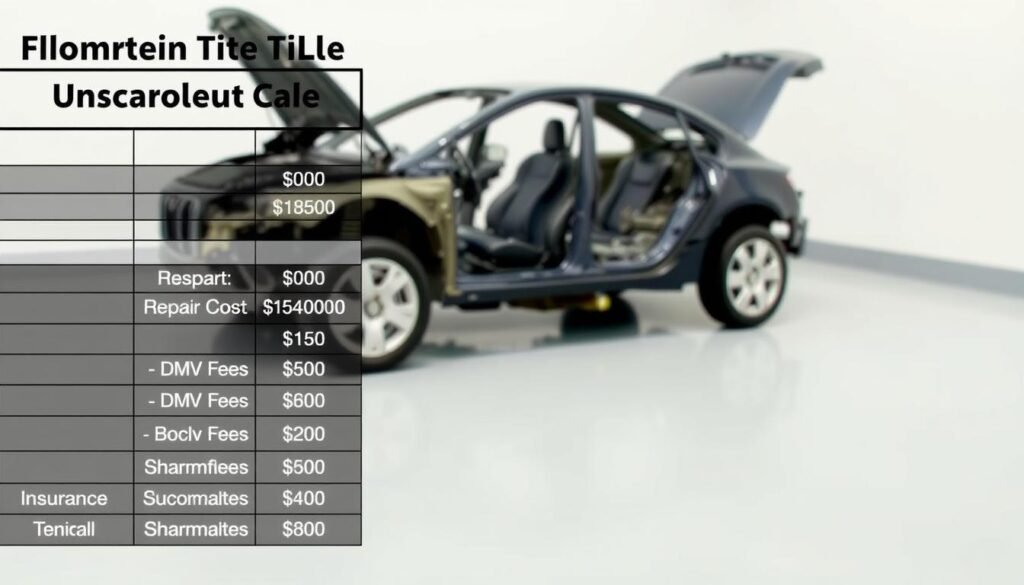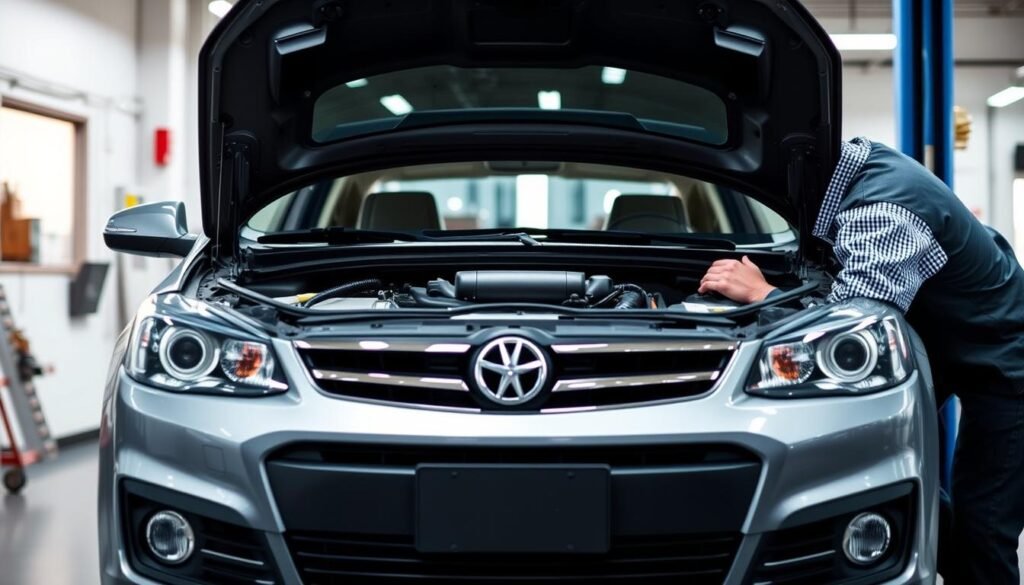Did you know 10% to 20% of used cars in the U.S. have a rebuilt or salvage title? This can really lower a car’s value. A rebuilt title can make a car worth 20% to 40% less.
It’s important for buyers to understand what a rebuilt title means. It shows a car was once a total loss but is now safe to drive. But, it can also mean the car might have ongoing mechanical problems.
When looking at a car with a rebuilt title, think about the damage it had. These cars are usually sold for 20% to 40% less than similar ones with clean titles. Knowing about rebuilt titles can help buyers make smart choices and avoid problems.
What Is a Rebuilt Title and Why Does It Matter?
A rebuilt title is for a car that was once totaled but fixed and checked for safety. It’s not the same as a salvage title, which is for cars not fixed. Knowing about rebuilt titles is key for buyers, as it affects a car’s value and insurance.
To get a rebuilt title, a car must pass many safety checks. In places like Ohio, cars with salvage titles need state patrol checks. Repair costs for salvage titles often go over 75% of the car’s value before the crash.
Rebuilt title cars might be 20% to 50% less valuable than similar clean title cars. Insurance for these cars can be 20% to 40% more expensive. The car’s past damage, repair quality, age, and state laws also play a part in insurance costs.
Key Differences Between Rebuilt and Salvage Titles
- Rebuilt title: issued to a vehicle that has been repaired and inspected to ensure safety standards
- Salvage title: given to a vehicle that has not been repaired and is considered a total loss
It’s important for buyers to know the difference between rebuilt and salvage titles. A rebuilt title car might cost less, but it comes with risks and challenges.
The Journey from Salvage to Rebuilt Status
A car can go from salvage to rebuilt title if it’s fixed and passes tests. This can change a lot by state. Most need proof of repairs and a pass on an inspection.
The cost to switch a salvage title to rebuilt can start at $100 or more. This depends on where you live.
The big difference between salvage title vs rebuilt title is when a car gets a salvage title. It’s when an insurance company says it’s totaled. A rebuilt title comes after it’s fixed and checked.
A rebuilt title vs clean title is also different. A rebuilt title stays with the car forever. It can make the car worth less when you sell it.
Some important things to know about going from salvage to rebuilt include:
- About 75% of states say a car is totaled if repairs cost more than 75% of its value before the accident.
- Cars with a rebuilt title might sell for 20% to 40% less than similar cars with a clean title.
- The average cost for a state safety check for a rebuilt title is around $200. But, this can change by state.
In short, going from salvage to rebuilt takes many steps. It involves checks, tests, and paperwork. Knowing the differences between salvage, rebuilt, and clean titles is key for car owners and buyers.
Rebuilt Title vs Salvage Title: Key Differences
When you buy a car, knowing the difference between a rebuilt title and a salvage title is key. A salvage title means the car was too damaged for insurance to fix. A rebuilt title means the car was fixed and is safe to drive.
Looking for rebuilt title vehicles for sale? You need to know how to get a rebuilt title. This means fixing the car and getting it checked by the state. But, a car with a rebuilt title costs less than one with a clean title, by 20-40%.
Here are some main differences between rebuilt and salvage titles:
- A salvage title is for cars that insurance says are too damaged to fix.
- These cars might not work, be unsafe, or need too much fixing.
- Rebuilt titles are forever; a car can’t go back to being clean once it’s rebuilt.
Insurance for cars with rebuilt titles might be hard to get. Rates might be higher too. Also, these cars are harder to sell, making them less popular. Knowing these differences helps you make a smart choice when buying a car with a rebuilt or salvage title.
The Vehicle Inspection and Certification Process
When looking at rebuilt title car insurance, the inspection and certification are key. A vehicle must pass many tests to get a rebuilt title. These tests check if the vehicle is safe and works right.
Buying a rebuilt title car has its ups and downs. These cars are often cheaper than clean title cars. But, they might not sell for as much and could cost more to insure.
Some places need extra papers before giving a rebuilt title. For example, in California, a special check is needed. In Texas, the state checks the car and wants repair records.
Thinking about rebuilt title cars means looking at both sides. They might be cheaper, but there are risks. These include hidden problems and higher insurance costs.
Choosing a rebuilt title car depends on many things. This includes the car’s history, the inspection process, and insurance options. By looking at these carefully, buyers can find a good car that fits their budget.
State-by-State Requirements for Rebuilt Titles
Every state has its own rules for rebuilt titles. Knowing these rules is key for buying or selling a rebuilt title vehicle. Rebuilt title insurance helps protect against problems from the vehicle’s past.
States need rebuilt vehicles to pass a special safety check. This check makes sure the vehicle meets safety standards. It must be done at special safety stations.
Documentation Requirements
What documents you need for a rebuilt title varies by state. You usually need to fill out a form, like the MV-426B. You also need to show proof of owning the vehicle, like a Pennsylvania Certificate of Salvage.
Inspection Standards
Inspection rules differ by state. Most require a Level 3 VIN check and emission tests when needed. Rebuilt title implications are big, so knowing your state’s standards is important.
Registration Procedures
To register a rebuilt title vehicle, you need to submit the right documents and inspection reports. You also have to pay fees. Knowing your state’s registration steps helps make the process easier.
The True Cost of Owning a Rebuilt Title Vehicle
Buying a car with a rebuilt title can be expensive. The rebuilt title process checks if the car is safe to drive. But, each state has its own rules, making things more complicated.
There are many costs with a rebuilt title car. You might pay more for insurance and repairs. Also, these cars can be harder to sell and may not be as safe.
Rebuilt title cars often sell for less than clean title cars. It’s important to check the car’s history and repairs. This helps avoid big problems later.

Knowing the costs of a rebuilt title car helps buyers make smart choices. They should think about the lower price but also the extra costs. This way, they can decide if it’s worth it.
Insurance Considerations for Rebuilt Title Cars
Insuring a rebuilt title car has its ups and downs. The good news is that these cars are often cheaper to buy. But, the bad news is that insurance can cost more. This is because some insurers think these cars might have hidden problems.
Some big names like State Farm and Geico will insure these cars fully. But, others like Progressive and Allstate might only cover the basics. This means you could pay up to 20% more for insurance compared to cars with clean titles.
Thinking about buying a rebuilt title car? It’s important to know both the good and the bad. Understanding insurance costs can help you make a smart choice. This way, you can find the right coverage for your car.
Here are some key things to think about when insuring a rebuilt title car:* Liability coverage* Uninsured motorist insurance* Personal injury protection* Possible limits on other types of insurance* Higher costs because of the car’s risk level
Pros and Cons of Purchasing a Rebuilt Title Vehicle
Thinking about buying a rebuilt title vehicle? It’s good to know the good and bad sides. These cars might cost 20-40% less than others. This can be a big plus for those watching their budget.
But, there are some rebuilt title risks to think about. These cars might not be as safe. Also, insurance could cost more. Some insurance companies might not cover them at all.
Also, getting a loan for a rebuilt title car can be tough. Banks and credit unions might see them as too risky. This could mean higher interest rates or no loan at all.
Some important things to think about with a rebuilt title car are:
- Lower purchase price (20-40% lower than similar cars with clean titles)
- Potential rebuilt title safety risks
- Higher insurance rates
- Challenges in securing loans
- Lower resale value
It’s important to think about these points carefully. This way, you can make a choice that fits your needs and budget.
In short, rebuilt title cars can save money. But, it’s key to weigh the good and bad sides. Think about the rebuilt title risks and rebuilt title safety too. This helps you make a choice that’s right for you.
How to Evaluate a Rebuilt Title Car Before Purchase
Buying a car with a rebuilt title needs careful thought. You must check the car’s condition and understand the risks. This includes looking at the car’s history and any financing options.
Get a mechanic to check the car before you buy it. They can look at the car’s body, engine, and electrical parts. They can also check for rust. Looking at the car’s repair records and inspection reports is also important.

- Vehicle history and repair records
- Inspection reports and certification documents
- Condition of the vehicle’s mechanical and electrical systems
- Presence of any rust or water damage
- Overall safety and reliability of the vehicle
By carefully checking a rebuilt title car, you can make a smart choice. Knowing about financing and laws in your state is also key. This helps you avoid problems.
Resale Value and Future Considerations
When looking at rebuilt title vehicles, resale value is very important. These cars are often cheaper than clean title models. But, they might not sell for as much later on.
Buying a rebuilt title car can save money upfront. But, it might not be worth as much when you sell it. This is because people might think the car has hidden problems.
Insurance for these cars can cost more too. It’s about 10-25% higher than for cars with clean titles. This is because of the car’s repair history.
It’s important to think about the downsides of buying a rebuilt title car. Things like hidden damages and higher insurance costs are big concerns. About 30% of buyers worry about the car’s value later on.
Most buyers want a car checked out by a pro before buying. This is to make sure it’s a good deal. About 90% of buyers do this to feel sure about their purchase.
Here are some important facts about rebuilt title cars:
- These cars might sell for 20-30% less than similar clean title cars.
- Insurance for them can be 10-25% more than for clean title cars.
- 15-25% of rebuilt title cars might have hidden problems.
In short, rebuilt title cars can save you money. But, think about how they might do in the future. Things like resale value and insurance costs are important. Doing your homework and getting a car checked out can help you make a smart choice.
Financing Options for Rebuilt Title Vehicles
Financing a vehicle with a rebuilt title can be tough. Rebuilt title conclusion and rebuilt title summary reports show lenders are cautious. But, there are some ways to get a loan for a rebuilt title car.
Some lenders might give you a loan for a rebuilt title car. But, the interest rates might be higher. It’s important to think about the loan options carefully. Also, consider what owning a rebuilt title car means for the long run.
- Personal loans: These can be used to finance a rebuilt title vehicle, but often come with higher interest rates.
- Specialized lenders: Some lenders, such as LightStream, offer financing for rebuilt title vehicles with competitive rates.
- Credit unions: Some credit unions, such as America First Credit Union, may offer financing for rebuilt title vehicles.
To get a loan for a rebuilt title car, you need a good credit score and a steady job. Rebuilt title summary reports help figure out the car’s value and risks.
Conclusion: Is a Rebuilt Title Car Right for You?
A rebuilt title car might be a good choice if you’re watching your budget. They can save you money compared to cars with clean titles. But, you should think about the risks before buying.
The rebuilt title meaning shows the car has been fixed to be safe and roadworthy. Yet, its past damage might worry you. It’s key to check the car well, look at the papers, and know the rules in your area.
Whether a rebuilt title car is right for you depends on your budget and how you feel about risks. Think about it carefully and do a full check. This way, you can choose what’s best for you.
FAQ
What is a rebuilt title?
A rebuilt title is given to a car fixed after being called a salvage vehicle. It shows the car works again.
How does a rebuilt title differ from a salvage title?
A rebuilt title means the car was fixed and checked okay. A salvage title means it was too damaged and might not work right.
What are the implications of owning a car with a rebuilt title?
A rebuilt title car might cost less but could have higher insurance. It might also be less safe and reliable.
How does the process of obtaining a rebuilt title work?
First, fix the car. Then, pass a state test. Lastly, show proof to the DMV to update the title.
What are the pros and cons of buying a car with a rebuilt title?
Buying one might save money. But, insurance could be more, and there might be hidden damage. It also sells for less.
How do the requirements for rebuilt titles vary by state?
Rules for rebuilt titles change by state. Check the local laws for what’s needed for your car.
How does a rebuilt title impact the insurance coverage and cost for a vehicle?
Insurance for a rebuilt title car might cost more. Companies might offer less coverage too.
What are the key considerations when evaluating a rebuilt title car before purchase?
Look for a detailed check by a pro. Check the car’s papers well. Watch for signs of hidden problems.
Source Links
- What is a Rebuilt Title vs. a Salvage Title? | Bankrate
- Rebuilt Car Title: What it is, Pros and Cons as a Consumer
- What Is a Rebuilt Title and Does It Affect Insurance?
- Buying a Used Car: What is a Rebuilt Title? | Montrose Auto Outlet of Cleveland
- What is a Rebuilt Title? | Chase
- Rebuilt Title vs. Salvage Title: Key Differences
- What is a Rebuilt Title? | Rebuilt vs. Salvage Title | ACV Auctions
- Rebuilt vs. Salvage Title: Know the Difference
- What is a rebuilt title vs. a salvage title?
- Ohio BMV
- Is Buying a Car with a Rebuilt Title Worth It? | Expert Insights
- FAQs • What is required to title a self-assembled or salvage
- PennDOT Fact Sheet – Reconstructed Vehicle Titling Procedure
- Salvage or Rebuilt Title | Department of Motor Vehicles
- Chapter 9 – Reconstructed, Rebuilt, Salvage and Nonrepairable Vehicles
- Rebuilt Title: Meaning, Pros, and Cons | Indy Auto Man, IN
- What Is a Rebuilt Title?
- Rebuilt Title: What It Is and How It Works (2025) | Insurify
- Does a Rebuilt Title Affect Insurance? How and Why? (2025)
- How to Insure a Car with a Rebuilt or Salvage Title
- Rebuilt Title Car – Should You Buy It? – Blog – Approval Genie – Online Car Loan Approval
- What is a Rebuilt Title and What You Need to Know
- Everything You Need to Know About Rebuilt Title Car Value!
- What Is a Rebuilt Title? | Veteran Car Donations
- Understanding the Impact of a Rebuilt Title on Vehicle Value – Capital Compass
- Rebuilt Title Car Loans Explained – Upsolve
- You can finance a salvage or rebuilt title car or truck. Here’s how.
- Can You Get a Loan for a Rebuilt Car Title?
- What is a Rebuilt Title? Rebuilt vs Salvage Title Explained
- Is it a good choice to buy a rebuilt title vehicle?









